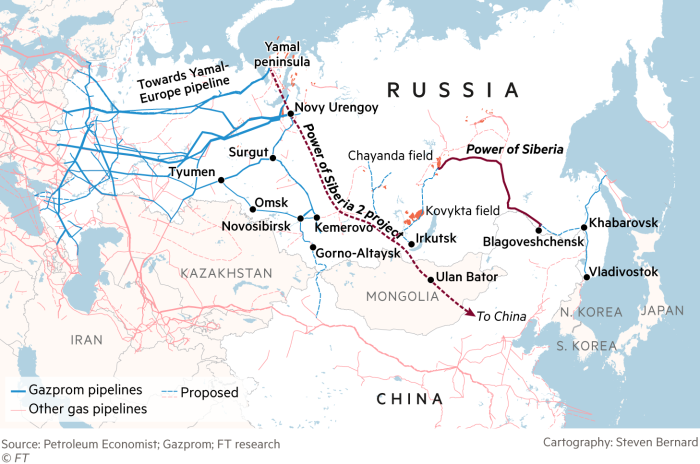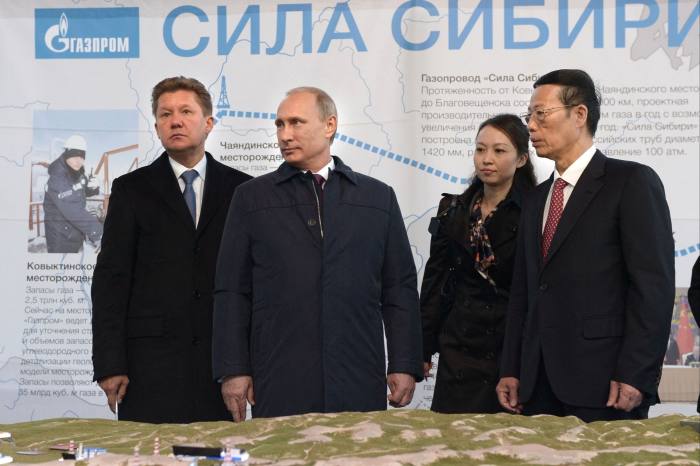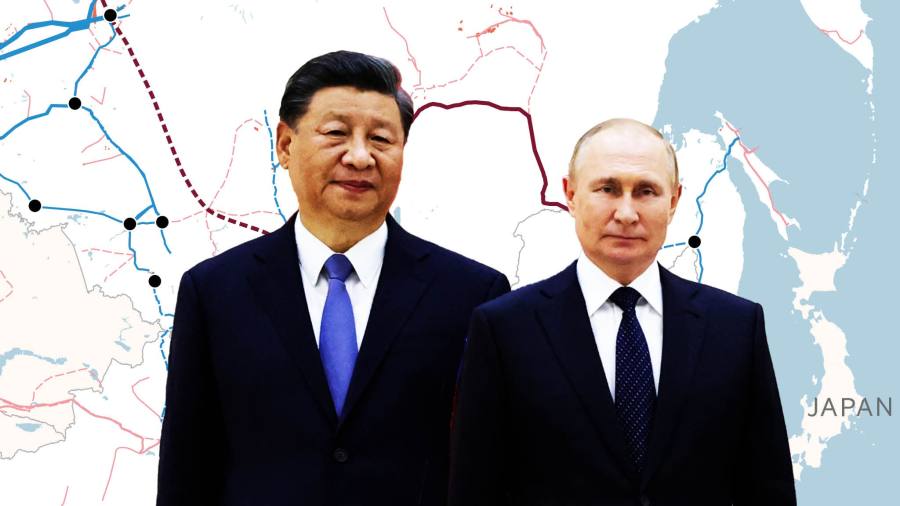The Russian prime minister left China this week without what Moscow has long cherished in return: Beijing’s clear commitment to Power of Siberia 2, a massive gas pipeline project aimed at changing the flow of energy across Asia.
Conceived more than a decade ago to help Russia “pivot east,” the pipeline to China through Mongolia was a way to diversify gas sales, boost revenue and give the Kremlin more diplomatic clout.
Originally named Altai after the mountains in southern Siberia, the project has gained urgency since the Ukrainian invasion, with Moscow looking for new export channels to get the gas to Europe before sanctions thwarted it.
The hurdle for Moscow is that Beijing — a key economic partner since its all-out invasion of Ukraine — doesn’t seem eager to get involved. Analysts say the silence shows just how little wartime Moscow’s bargaining power has become in dealing with its economically stronger neighbors.
Another Russian pipeline, Power of Siberia, started up in 2019 and is expected to reach a maximum capacity of 38 bcm per year by 2024. But the pipeline relies on developing new gas fields in eastern Siberia that have never delivered fuel to Europe — making it less useful for Moscow’s diversification strategy.
In contrast, PS-2 is designed to supply gas to China from the northeast of the Yamal peninsula, which has historically served the European market through several pipelines, including Nord Stream, whose supply stopped flowing even before the dispute with the EU It is destroyed in 2022.

Seeking alternatives has shifted from Russia’s strategic option to its only option.
“Beijing has a history of prolonging negotiations to get a better deal — and that was the case when negotiating Power in Siberia,” said Alicja Bachulska, a China policy expert at the European Council on Foreign Relations. As Russia’s aggression against Ukraine has turned into a protracted war, Beijing believes its negotiating position with Moscow will only grow stronger.”
Taking it slow could allow China to get lower gas prices through pipelines, she added.
In the months leading up to the war, negotiations between China and Russia over the pipeline intensified. During the Beijing Olympics, Vladimir Putin and Xi Jinping signed a 25-year contract for the Far East route and “definitely talked about PS-2,” said Tatiana Mitrova, a fellow at Columbia University’s Center for Global Energy Policy.
But since then, Beijing has remained conspicuously silent, despite Russia’s repeated emphasis on its readiness to launch the PS-2. During a visit to the Kremlin in March, Xi bypassed PS-2 — and Putin spoke of the plan as if it were already complete, saying “almost all the parameters . . . have been finalized”.

Gergely Molnar, a natural gas analyst at the International Energy Agency, said China has been aggressively securing gas contracts for more gas than it needs in order to avoid becoming overly dependent on any one supplier.
China relies on Russia for just over 5 percent of its natural gas supplies, he said. Combined with plans to increase supply via Russia’s existing routes, the agreement on PS-2 will increase this share to around 20% by the early 2030s.
China will indeed benefit from the pipeline. It is keen to diversify the country’s energy sources, especially in the event of geopolitical or military tensions with the West, where supplies from Russia and Central Asia are safer overland than sea.
“Compared with the distant Middle East, it is safer to transport natural gas through Russia by land,” said Lin Boqiang, director of the China Energy Policy Institute at Xiamen University.

From left, Gazprom CEO Alexei Mueller, Russian President Vladimir Putin and Chinese Vice Premier Zhang Gaoli attend the 2014 Power of Siberia First Chain Welding Ceremony © Alexey Nikolsky/RIA NOVOSTI /AFP/Getty Images
There are geopolitical complexities in reaching an agreement against the backdrop of the Ukraine war. But some Chinese policy experts believe that a deeper energy partnership with Russia is only a matter of time.
“No one should really expect China to cut off its supply of Russian oil and gas,” said Govik, vice president of the China and Globalization think tank in Beijing. “This kind of trade is normal and peaceful trade.”
He said the huge energy trade between Russia and China “will eventually lead to a reconfiguration of the world’s oil and gas supplies. . . the West should not be surprised”.
For Russia, building the PS-2 is the only way to make up for at least some of the lost EU markets. This market accounts for most of the natural gas produced on the Yamal Peninsula. But that means China now has no particular incentive to agree to the new pipeline.

In fact, China has been busy developing other overland supplies. At a summit with the Central Asian nation last week, Xi backed the construction of the so-called Line D pipeline, which would be China’s fourth pipeline in the region to carry gas from Turkmenistan.
Last year, Turkmenistan exported about 3.5 billion cubic meters of natural gas to China via three pipelines. In comparison, Russia sent 16 bcm through Force Siberia.
Even with the PS-2 pipeline, Russia cannot make up for its lost sales in Europe. The price of this natural gas will also be reduced. The price of gas delivered through the first Power of Siberia pipeline was well below the price on the European market – on terms agreed at a time when Russia was in a much stronger negotiating position.
Sergey Vakulenko, former strategy director of Gazprom, said Russia could not even match the price China paid for importing pipelines from other suppliers.
Taking these factors into account, PS-2 would bring Gazprom about $12 billion a year in revenue, of which the state would get about $4.6 billion, said Ronald Smith, senior oil and gas analyst at BCS Global Markets. Duties and taxes.
That amount, equivalent to less than half of Russia’s average monthly energy revenue in 2023, would hardly be transformative. But with ballooning budget deficits, rising costs of the war and dwindling gas sales in Europe, the Kremlin desperately needs the extra revenue. “The gas has nowhere to go,” said Columbia University’s Mitrova.


